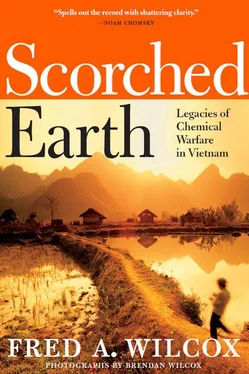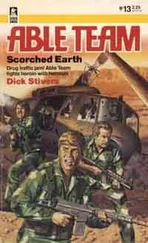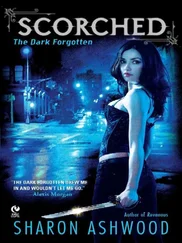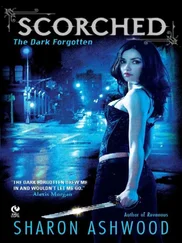The 1925 Geneva Protocol provision was designed to outlaw poison gases such as mustard gas used in World War I. It cannot be interpreted to encompass the use of herbicides which were not then known weapons and were far different in their purpose and effect. The gases outlawed in 1925 had an almost immediate disabling effect on those exposed and were intended to disable or kill human beings. In contrast, herbicides were designed to strip plants of leaves or kill them.” 23
Weinstein argues that if large numbers of people happen to have been poisoned, as a side effect of defoliation in a war zone, that does not constitute a crime against humanity or a violation of any treaty to which the US was a signatory at the time the poisoning occurred. He rejects the Vietnamese plaintiffs’ argument that the use of Agent Orange during the war was a violation of international laws prohibiting genocide, enslavement, deportation or forcible transfer of population, torture, or forced pregnancy. Agent Orange and other defoliants were used, he says, to kill trees, not to harm human beings, in Vietnam.
Regarding the government contractor defense—that the chemical companies were only following orders and, therefore can not be sued—Judge Weinstein gives a detailed account of the genocidal use of Zyklon B during World War II. After the war, Bruno Tesch, Joachim Drosihn, and Karl Weinbacher were charged with committing war crimes by supplying poison gas to concentration camps, knowing full well that the gas would be used to kill human beings. Tesch and his partner Stabernow owned a firm that provided technicians—Drosihn was the senior technician—to help carry out gassing operations, and to train the Wehrmacht and S.S. in how to use Zyklon B.
The prosecution in the Zyklon B case argued that the Third Reich had given direct orders to Tesch’s firm to supply poisonous gas, and that, fully aware that this product was being used to exterminate vast numbers of people in concentration camps, Tesch and associates followed this order.
The prisoners were charged with violating Article 46 of the Hague Regulations of 1907, which Germany and Great Britain had signed. Tesch claimed that he’d not heard, nor did he know, anything about using Zyklon B to exterminate people in camps like Auschwitz. Tesch’s defense team argued that it was one thing to provide a supply of a product meant only to kill human beings, and quite another to sell a product (Zyklon B had been used in small quantities to delouse people) that had other “legitimate” uses.
The prosecution questioned how Tesch and associates could not have known exactly how their product was being used, and that therefore they were guilty of accessories before the fact to murder. Tesch and one associate were found guilty and sentenced to die for their crimes.
In the 1984 class action lawsuit filed on behalf of Vietnam veterans and their families, Weinstein allowed the defendant chemical companies’ “government contractor” defense. The companies argued that they told the government what they knew about dioxin, and that they were just trying to help the United States win the war.
Gerson H. Smoger, an attorney who has represented Agent Orange victims for many years, questions the chemical companies’ claim that they told the government everything they knew about dioxin.
“I have reviewed literally millions of pages of documents,” Smoger told a Vietnamese reporter. “It seems that the manufacturers conspired to hide the dangers from the US government and the rest of the world. The chemical companies knew about the dangers and held secret meetings with the purpose of conspiring to keep the knowledge of the dangers from the US government.” 24
This time, Weinstein denies the government contractor defense, and refuses to accept the argument that the defendants were acting out of necessity when they supplied Agent Orange to the government.
In order to use the Necessity Defense, a defendant must establish:
• That the criminal conduct of which the defendants stand accused was taken to prevent a greater harm to themselves or others, which was imminent.
• That there was no effective legal alternative method or course of action available to them that could be taken to avert this so-called harm, and
• That there was a direct causal relationship between the criminal conduct taken and the avoidance of the alleged harm. 25
The most serious harm that could have come to defendants if they had refused to supply Agent Orange would have been loss of their manufacturing establishments and other assets through expropriation. Such possible economic harm would not have been more evil than violating international law ( if it existed), leading to the alleged death and disease of many persons and destruction of much land ( if there was causation).
We are a nation of free men and women habituated to standing up to government when it exceeds its authority…. Under the circumstances of the present case, necessity is no defense. If defendants were ordered to do an act illegal under international law they could have refused to do so, if necessary by abandoning their businesses. 26
Yet Judge Weinstein denied that lawyers for the plaintiffs demonstrated “causation,” and argued that there is no scientific evidence to support the plaintiffs’ claims that Vietnamese people are sick and dying as a result of their exposure to toxic herbicides.
Lawyers for the Vietnamese plaintiffs and the chemical company defendants packed their bags, knowing that this was not the last act in the Agent Orange saga. They will meet again in appellate courts, where they will argue before judges who, like Judge Weinstein, will profess compassion and empathy for victims of Agent Orange, but conclude that they can find no way to hold the chemical companies or the government accountable for the legacies of a decade-long campaign of chemical warfare in Southeast Asia.
In one section of his Memorandum, Judge Weinstein deconstructs the international agreements that plaintiffs submit as a basis for their argument that the use of toxic herbicides in Vietnam constituted a war crime.
In response to clause (a) of the 1907 Hague Convention IV, which forbids nations to employ poison or poisoned weapons:
The poisons referenced in clause (a) encompass those applied to specific instruments of warfare such as bullets or bayonets…. Even if the terms “Poison” or “poisoned weapons” could be construed more broadly to encompass poisonous gases, this broader definition still would not reach herbicides, regardless of whether they have collateral harmful consequences for humans. 27
On the subject of war crimes:
Whoever, whether inside or outside the United States, commits a war crime, in any of the circumstances described in subsection (b) shall be fined under this title or imprisoned for life or any term of years, or both, and if death results to victim, shall also be subject to the penalty of death.
Judge Weinstein writes that:
Herbicide spraying by the United States did not constitute “Willful killing” or “willfully causing great suffering or serious injury in body or health” since the United States lacked the requisite criminal intent. 28
The spraying did not constitute “torture” or “inhuman treatment,” that is, the defoliation campaign in Vietnam did not injure the Vietnamese people’s human dignity. “As for property damage, any such damage was justified by military necessity and was carried out lawfully.” 29
On the subject of genocide:
Genocide: (a) Killing members of the group; (b) Causing serious bodily or mental harm to members of the group; (c) Deliberately inflicting on the group conditions of life calculated to bring about its physical destruction in whole or in part; (d) Imposing measures intended to prevent births within the group; (e) Forcibly transferring children of the group to another group.
Читать дальше












